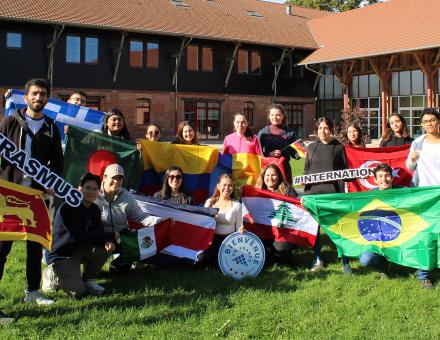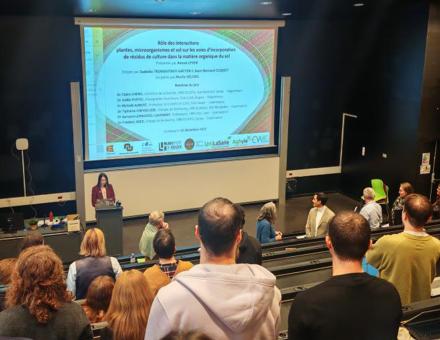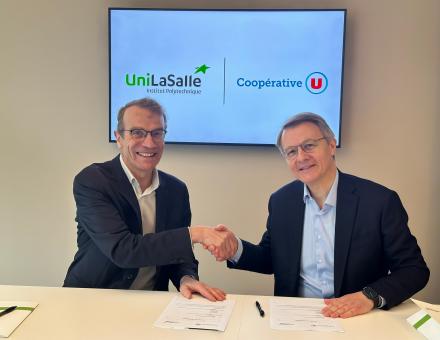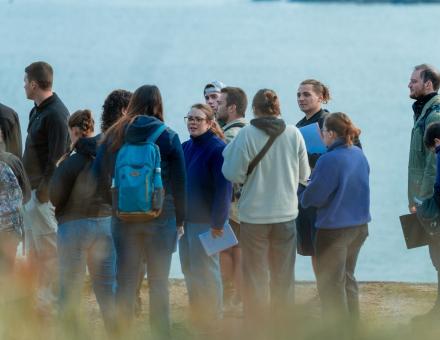The Social and Circular Economy Chair, structuring sustainable supply chains, was launched on Thursday October 5 at UniLaSalle Rennes.
UniLaSalle Rennes, the first school in France 100% dedicated to the environment, announces the launch of its very first Social and Circular Economy Chair. This 4-year teaching and research chair brings together Valdelia, a key player in the second life of products and materials, and the UniLaSalle Rennes research unit, whose training programs (Environmental Engineering, Bachelor's in Environment and Sustainable Development, Specialized Master's in Circular Economy, Master of Science) are at the heart of the challenges of ecological transition.
Work to develop innovative solutions for sustainable second-life industries and territories
At the crossroads of research and training, the Social and Circular Economy Chair at UniLaSalle Rennes stands out for its commitment to structuring sustainable sectors and highlighting the importance of research into issues that have yet to be fully explored, in the field of the Social and Solidarity Economy (SSE): reuse and the second life of products.
Faced with the depletion of natural resources and the overproduction of waste, this Chair is committed to three essential dimensions:
- The organization of channels in the reuse sector: UniLaSalle Rennes teachers-researchers and students will be able to draw on the expertise of Valdelia, the eco-organization behind this Chair, which has specialized for 12 years in the collection, recycling and reuse of all used professional furniture. Together, they will explore the links between traditional players in the reuse sector and new operators emerging from the traditional economy, to organize sustainable, circular management of products, equipment, materials and waste from these large-scale sectors. Research will focus on the regulatory and insurance framework for second life, and explore new certifications adapted to the specific challenges of reuse.
- Transforming professional practices, by imagining new circular economy professions and training students for them: Identifying the skills needed and structuring training offers to build the new chain of second life professions in a world in digital transition.
- Research into the changing regulatory framework: Analyze a changing legislative framework (AGEC law, PMCB EPR sector, national reuse targets) and examine insurance issues, exploring new forms of certification and labeling.
A multidisciplinary approach
"This Chair has been designed to take a holistic, multidisciplinary approach to reuse. It mobilizes experts from a variety of backgrounds: human sciences, social sciences, engineering sciences... all disciplines taught at UniLaSalle Rennes. It is based on environmental assessment methods such as life cycle analysis (LCA) and environmental impact assessment, and aims to develop new tools for the industry," says Geoffroy Belhenniche, Director of UniLaSalle Rennes and Director of the Ecological and Societal Transformation of the UniLaSalle Group.
In addition, it will study the socio-economic approach of players in the second-life industries, as well as the institutional framework and transformations undergone by these players.
Missions and partnerships with impact
This innovative program aims to combine academic research with the challenges faced by eco-organizations in fulfilling their missions.
"The dynamics of this Chair are based on both UniLaSalle Rennes' expertise in environmental engineering and the circular economy, and Valdelia's ecosystem, on which the research work will be based. It's a valuable and meaningful complementarity, the result of a genuine network of academic and socio-economic partners," explains Arnaud Humbert-Droz, CEO of Valdelia and a Valdelia alumnus.
The teaching component will enrich students' training by equipping them with solid skills in reuse and recycling.
In parallel with this launch, and directly linked to the Chair's initiatives, UniLaSalle Rennes is creating an éKolab, a laboratory-like creative space open to the public. It combines the features of a fablab, a classroom, a low-tech laboratory, a third place and a matériauthèque focusing on recycled and second-life materials.






